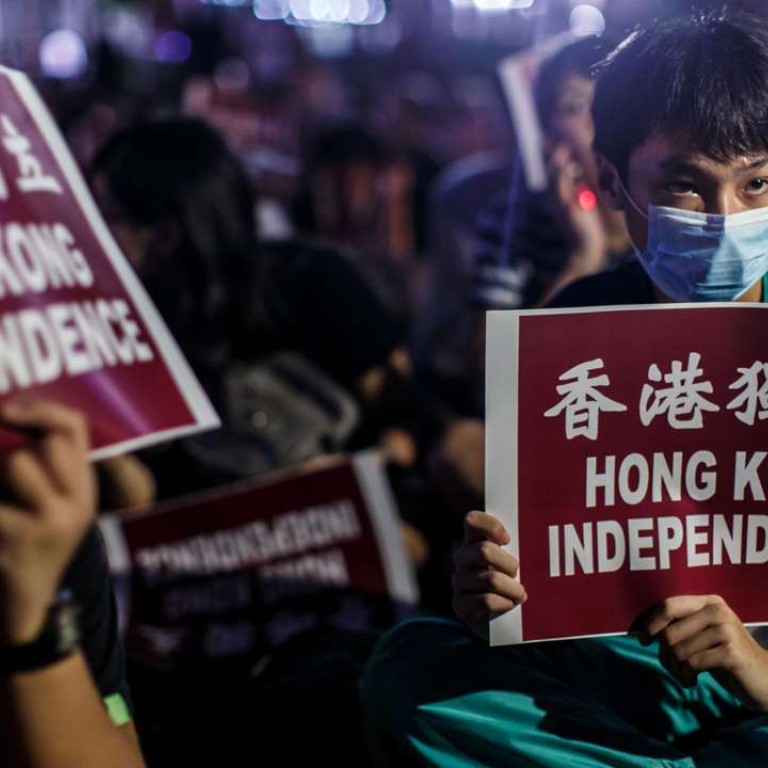
Why political apathy is a bigger threat to Hong Kong’s future than independence calls
Nicholas Gordon says amid the overreaction to the burgeoning localist movement, we aren’t doing enough to address the disillusionment and cynicism behind it
The surprising rise of the independence movement has changed the rhetoric on both sides of the political spectrum: the establishment is now defending public events that criticise the mainland, noting that it is important for Hong Kong people to stay engaged with China, while the pan-democrats are trying to determine how best to capitalise on the energy of student activism without endorsing it entirely.
Much of the commentary about independence, at least from establishment sources, seems to alternate between dismissal, finger-wagging and outright panic. This attitude is misguided. These sources are right to note that independence is unconstitutional, practically unfeasible and probably unsupported by a majority of Hong Kong people. But this does not mean harsh criticism and lecturing is the right strategy to tackle the independence movement, or the cynicism about politics that has sparked it.

The yearly protests, despite being a headache for the government, are proof that Hong Kong’s population cares deeply about its future
Instead, the biggest threat is political apathy: a growing disillusionment that Hong Kong’s political system will be able to confront its pressing challenges, fulfil the needs of its people, or defend its interests. The independence campaign is not a cause of Hong Kong’s current troubles, but is instead a symptom of a wider mistrust in the government.
Hong Kong functions as well as it does due to its independent and well-designed institutions: an independent judiciary, an efficient civil service, a well-respected police force, a vibrant media, and so on. The yearly protests, despite being a headache for the government, are proof that Hong Kong’s population is politically active, and cares deeply about its future.
But remove this energy, and it is not clear that Hong Kong would work as well. Independence may make today’s headlines, but far more dangerous in the long term is a young population that views the government with cynicism, and is too jaded to see public service or public policy as a valuable use of its time.

Deeper divisions or greater unity in Hong Kong society? Ultimately, it’s in the hands of young voters
Apathy can be dangerous to any society, including democratic ones. The US, for example, is continually plagued by low turnouts for non-presidential elections. Many voters, especially the young, do not have enough information about local politics to take part, or choose not to vote due to their disappointment with the political process. This low turnout allows more extreme candidates (like those in the Tea Party) to win office. The same can be said about the recent British referendum to leave the EU: many commentators have noted that, if the young had voted at the same rate as the elderly, Britain would have almost certainly voted to remain.
The better argument is to stress that Hong Kong is already independent, in all the ways that matter
Luckily, Hong Kong’s population still seems to be aware and active. Despite all the talk about independence, it is also true that applications to universities on the mainland are the highest they have ever been, meaning that part of Hong Kong’s youth do see China as part of their future. And even student activism has a positive spin to it: these students care about building a better Hong Kong.
The risk of apathy growing in Hong Kong could come from many paths, but two immediately come to mind.
The first is a continued inability to get things done. Gridlock in the short term is not necessarily harmful, but a long-term inability to discuss and compromise is ultimately harmful. Why engage in the political process if, in the end, nothing will change?

A wish list for Hong Kong in 2016 to break the cycle of dysfunction
The second is the failure of the establishment to state clearly and succinctly that it will defend Hong Kong’s rights and privileges under “one country, two systems”. To put it another way: the establishment reaction to the independence movement is to critique activists for “not loving China” when, perhaps, the better argument is to stress that Hong Kong is already independent, in all the ways that matter.
Blame for mistrust and gridlock can be apportioned to both sides of Hong Kong’s politics
Blame for mistrust and gridlock can be apportioned to both sides of Hong Kong’s politics. But the establishment will have to move first – that is part of the responsibility of being the government. If a prominent establishment figure – perhaps someone considering running for chief executive next year – were to say that they will defend Hong Kong’s powers under “one country, two systems”, and that such a political goal has no impact on one’s “Chineseness”, this would go a long way towards building bridges.
For Hong Kong to continue to inspire people and resolve its pressing challenges, more people need to be willing to talk to one another. There are enough reasonable people in the establishment for this to happen. There are enough reasonable people among the pan-democrats for this to happen. And, having listened to some of the student activists, I can safely say that there are a few reasonable people among that group too. A wish to preserve Hong Kong’s unique characteristics ultimately connects all three – recognising that will help to head off the larger threat to Hong Kong’s future.
Nicholas Gordon is a researcher working for the Global Institute for Tomorrow, a Hong Kong-based think tank. The views expressed are his own

